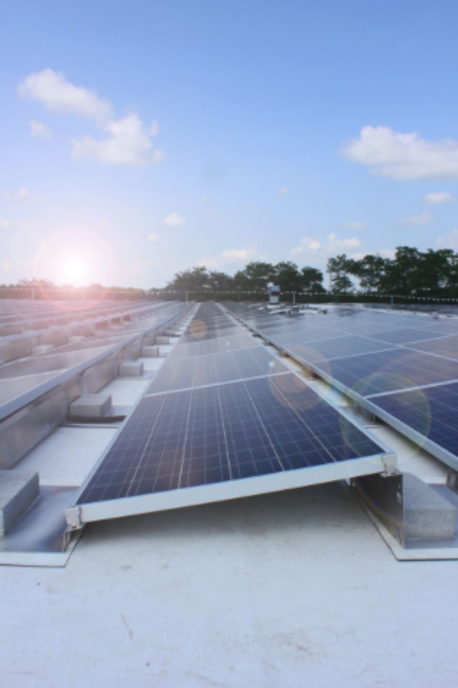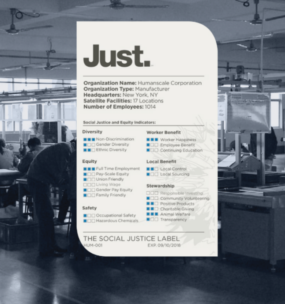Humanscale Provides Roadmap to Net-Positive Manufacturing
This past Wednesday marked the earliest Earth Overshoot Day to date, the day we have used more from nature (ecological resources and services) than the planet can regenerate in a year. It serves as an important reminder of the greater impact that our daily actions can have on the earth. In light of this unprecedented event, we are proud to share how Humanscale is taking this responsibility to heart. The company just released its CSR Report for 2017 detailing impressive initiatives to reduce waste and emissions, further material transparency and create a cohesive and engaged company culture that approaches its net positive mission as team. Collectively, Humanscale is working to offset its footprint with measureable positive impacts, or handprints, through the efforts explained below.

Transparency, Partnerships and People Revealed as Key Strategies in 2017 Corporate Social Responsibility Report
With sustainability as a core value from its inception, a new Corporate Social Responsibility Report (CSR) Report from Humanscale underscores the company’s commitment to achieving a net positive impact and lays out a corporate sustainability roadmap raising the bar for the manufacturing industry. The new CSR report reveals several areas of focus, including material transparency, responsible manufacturing and handprinting and highlights Humanscale’s progress as it works toward its own ambitious goals. Continuing a decade-long trend of reduction, in the past year alone, the company reduced normalized energy by 10% and reduced greenhouse gasses by 12% over the baseline year.
“We believe every organization needs to be self-sustaining, operating on its own water, power, etc. and ultimately make a positive contribution to the environment. This is how nature works and is the only way we can ensure the long-term survival of our planet,” says Humanscale Founder and CEO Bob King. “Our unwavering commitment to making the office and the world a healthier place continues to propel us forward and raises the bar for the industry at large.”
Initiatives That Make an Impact:
Sustainable Manufacturing
Continuing to raise the bar for sustainable manufacturing, in 2017 100% of the water used in the company’s main production facility in North America was captured rainwater. Based in Piscataway, New Jersey, this production space derived over 80% of its energy from solar panels and overall the company achieved a 3.5% reduction in greenhouse gases, part of an overall 64.6% reduction since its baseline year of 2011. Aiming to divert 90% of waste produced at all facilities, Humanscale achieved the New Jersey Recycling Award from the New Jersey Department of Environmental Protection and the Association of New Jersey Recyclers for the Piscataway location. Across facilities, Humanscale experienced no significant wastewater discharge and hasn’t experienced any spills nor affected nearby water.
Living Product Challenge
In 2016, Humanscale was the first company to achieve full Living Product Challenge certification, meeting the stringent sustainability standards set by the International Living Future Institute for two of its products, the Float table and the Smart chair. As of December 2017, Humanscale remained the only company to achieve full, rather than partial, Living Product Challenge certification. Today Humanscale maintains a tally of the Living Product Challenge-certified products it manufactures along with their corresponding footprints. When Humanscale began working toward the Living Product Challenge, it committed to ensuring the entire supply chain would be net positive in terms of water and energy use and emissions in 3 years, a commitment it continued to move forward in 2017.

Material Transparency
Since 2014, Humanscale has participated in voluntary labeling programs, such as Health Product Declarations (HPD) and Declare labels, as a way to help its customers make informed choices about the products they buy. With the belief that products should have ingredient labels that clearly disclose what they’re made of, like food products do, the brand launched four new products with Declare labels in 2017; QuickStand Eco, Infinity, QuickStand Underdesk and Diffrient Smart. To date, 57% of Humanscale products carry Declare labels and HPDs. Humanscale has published a total of 16 HPDs, all of which are LEED v4 compiant. These labels represent Humascale’s commitment to avoiding Red List materials and chemicals of concern, many of which are common in the furniture industry, including Formaldehyde, PVC, Chrome 6, PFC stain-resistant coatings and HFR flame retardants.
To further demonstrate the brand’s commitment to transparency, in 2017 Sustainability Officer Jane Abernethy was elected to the HPD Collaborative Board of Directors. Humanscale has also contributed to the HPDC Technical Committee and is leading the Supplier HPD development that could benefit other manufacturers and their efforts to achieve material transparency in their supply chains. In 2017, Humanscale was also one of the first manufacturers to participate in the Health Product Declaration Collaborative’s (HPDC) third-party verification program. A long-time advocate for more stringent requirements in material transparency in manufacturing, Humanscale sees the program as an important step in that direction. It submitted the Diffrient Smart chair for third-party evaluation, which was verified and accepted by the HPDC.

Sustainability Champions
In 2017, Humanscale implemented the Sustainability Champions program. Ten employees from different offices and with various roles and tenures at the company signed up to run a program called HOME (Help Our Mother Earth). Sustainability Champions expand and enhance sustainable culture across company offices and locations, implementing practices to reduce waste, source sustainable resources and inform and engage other employees. Together, the Sustainability Champions have helped the company reduce emissions and energy use while preserving natural resources.
“The vision to go beyond sustainability and have a net positive impact was set at the highest level, but it has been wholeheartedly embraced throughout the organization,” says Sustainability Officer Jane Abernethy. “From a product engineer who conscientiously chooses healthy materials, to an office manager who reminds her team members about recycling, to an operations manager who chooses LED lighting, the impact we have as a company is the sum of the impact of our team members.”
Wildlife Conservation
Carrying on a partnership established in 2008, Humanscale is continuing its work with the World Wildlife Fund to support wildlife conservation and research in Cambodia. In 2017, Humanscale helped to fund two studies, the first of their kind in the Eastern Plains Landscape, on the globally-endangered Elds deer and green peafowl, as well as environmental DNA (eDNA) surveys. These eDNA surveys allow researches to determine whether a species is present in a habitat based on DNA they find in the environment. Humanscale also funded surveys on leopards.
A Net Positive Future: Partnerships and Associations
Humanscale is working with a number of other organizations to pursue a collective goal to achieve a better environmental impact. It’s a founding member of both NextWave and the Net Positive Project, is a member of the United Nations Global Compact and the United States Green Building Council, and continues to work with organizations including the International Living Future Institute, the World Wildlife Fund and Lonely Whale to contribute a net positive future.





